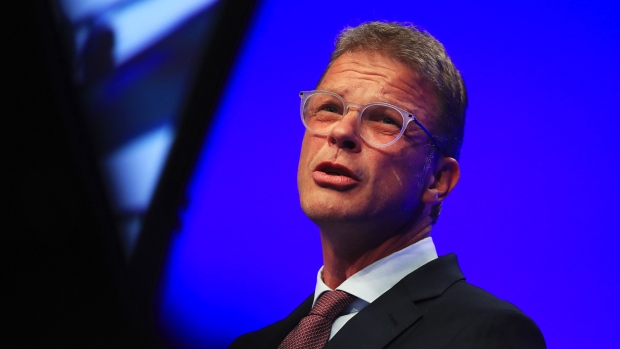Sep 7, 2022
Deutsche Bank CEO Sewing Says Germany Is Destined for Recession
, Bloomberg News

(Bloomberg) -- Europe’s largest economy is set for contraction on the back of soaring inflation, energy supply bottlenecks and the disruption to global supply chains, Deutsche Bank AG Chief Executive Officer Christian Sewing warned.
“We will no longer be able to avert a recession in Germany,” Sewing said during a speech in Frankfurt on Wednesday. “We believe that our economy is resilient enough to cope well with this recession -- provided the central banks act quickly and decisively now.”
The crisis triggered by Russia’s invasion of Ukraine hit a new peak when Gazprom PJSC announced this month that it is suspending gas flows through its biggest pipeline to Europe indefinitely. The European Union is racing to come up with ideas to keep the gas crisis from turning into an economic meltdown, and energy ministers are set for an emergency meeting in Brussels on Friday.
“The longer inflation remains high, the greater the strain and the higher the potential for social conflict,” Sewing said.
Decisive Action
The European Central Bank is set to sharply increase interest rates when it meets later this week, with economists expecting a rise in the benchmark cost of borrowing of as much as 75 basis points.
Sewing has previously said that a full stop of Russian gas deliveries would tip Germany into a recession. Several lenders including Commerzbank AG have said they will need to ratchet up credit provisions under the scenario, even though they expect government support to mitigate the hit.
Sewing said Wednesday that he expects an increase in credit defaults to take place eventually, although the lender wasn’t seeing them yet and didn’t expect them to call profitability into question.
Read More: Russian Gas Threat Has German Bankers Fearing Default Spike
German factory orders fell for a sixth month in July as inflation and uncertainty about energy supplies undermine confidence. Chancellor Olaf Scholz’s government announced 65 billion euros ($64.5 billion) of new measures to help households and businesses cope with the squeeze, though economists reckon that won’t be enough to stave off a recession.
An activity gauge by S&P Global last week showed factories slowing down in large parts of the euro area in the face of deteriorating purchasing power among consumers.
Sewing argued that the supply-bottlenecks and energy crisis had rammed home that Germany needs to limit reliance on other countries. “We must not allow ourselves to add a further dependency -- access to finance -- to our current dependencies on gas, raw materials and supply chains,” he said.
“We must not leave the playing field and with it the access to global capital markets largely to foreign banks,” he said.
European consolidation is needed to achieve that goal, he said. “The above points are not new, but they are becoming more urgent,” he said.
Speaking at the same conference, the CEO of UniCredit SpA, which operates a major part of its business in Germany, said that he nevertheless expects any recession in the second half of the year to be shallow.
UniCredit is still targeting a full-year adjusted profit target excluding Russia at 4 billion euros, Andrea Orcel said.
“Obviously if we have a deep recession, this changes,” Orcel said.
(Adds comments from UniCredit’s Orcel in final paragraphs)
©2022 Bloomberg L.P.


